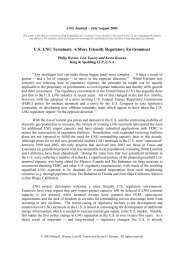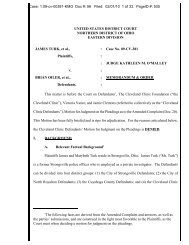Client Alert: 2012 OPDP Warning and Untitled Letters
Client Alert: 2012 OPDP Warning and Untitled Letters
Client Alert: 2012 OPDP Warning and Untitled Letters
You also want an ePaper? Increase the reach of your titles
YUMPU automatically turns print PDFs into web optimized ePapers that Google loves.
222<strong>2012</strong> <strong>OPDP</strong> <strong>Warning</strong> <strong>and</strong> <strong>Untitled</strong> <strong>Letters</strong><br />
Date with<br />
Hyperlink<br />
to Letter<br />
Drug <strong>and</strong> Indications Referenced<br />
in Letter<br />
(MS).<br />
Boxed<br />
<strong>Warning</strong><br />
Form of<br />
Communication<br />
Summary of Alleged Violations<br />
able to walk longer distances with decreased use of assistive devices, but<br />
clinical studies do not indicate whether the observed change in walking<br />
speed in patients supports this claim.<br />
o Claims <strong>and</strong> images suggest that treatment can have a positive impact on the<br />
disability caused by MS such that patients can carry out daily activities that<br />
they may have stopped due to difficulty walking, but poll results do not<br />
constitute substantial evidence supporting this claim.<br />
Minimization of Risk Information:<br />
o Video minimizes the risks of Ampyra by failing to convey significant risk<br />
information during the patient interview <strong>and</strong> presenting the majority of risk<br />
information to a running telescript format with rapidly scrolling, small text.<br />
o Video statement implies that patients who experience adverse events such<br />
as paresthesia <strong>and</strong> insomnia “will get used to it” <strong>and</strong> such events will<br />
disappear within a month, but FDA is not aware of substantial evidence or<br />
experience supporting this claim.<br />
06-25-<strong>2012</strong> Equetro®<br />
For treatment of acute manic <strong>and</strong><br />
mixed episodes associated with<br />
Bipolar I Disorder.<br />
Yes<br />
Professional<br />
Webpages<br />
Omission/Minimization of Risk Information:<br />
o Webpages entirely omit all risk information from the Contraindications <strong>and</strong><br />
Precautions section of the PI, as well as certain warning information.<br />
o Statement referring readers to the full PI does not mitigate the omission of<br />
important risk information.<br />
o Webpages fail to include important material facts regarding the increased<br />
risk of suicidal behaviors <strong>and</strong> ideation associated with use of the drug.<br />
o Webpages misleadingly claim that anti-epileptic drugs “may increase” the<br />
risk of suicidal thoughts or behaviors when the PI indicates that a direct<br />
relationship between such drugs <strong>and</strong> suicidal behavior <strong>and</strong> ideation has<br />
been determined.<br />
Unsubstantiated Claims:<br />
o Claims suggest that patients treated with Equetro will experience no weight<br />
gain when this has not been demonstrated <strong>and</strong> data from pivotal trials<br />
clearly demonstrate a weight increase in patients during Equetro treatment.<br />
o Webpage presents an open-label extension study in support of no weight<br />
gain claims, but safety data derived from the study do not constitute<br />
substantial evidence <strong>and</strong> there was a significant drop-out rate in the study.<br />
o Claims <strong>and</strong> presentations suggest that patients with Bipolar I Disorder<br />
treated with Equetro experience no worsening of depression or depression<br />
symptoms when this has not been demonstrated. The cited study is not<br />
substantial evidence because the depression score used in the study was not<br />
a pre-specified measure <strong>and</strong> the study itself calls for larger controlled<br />
14

















